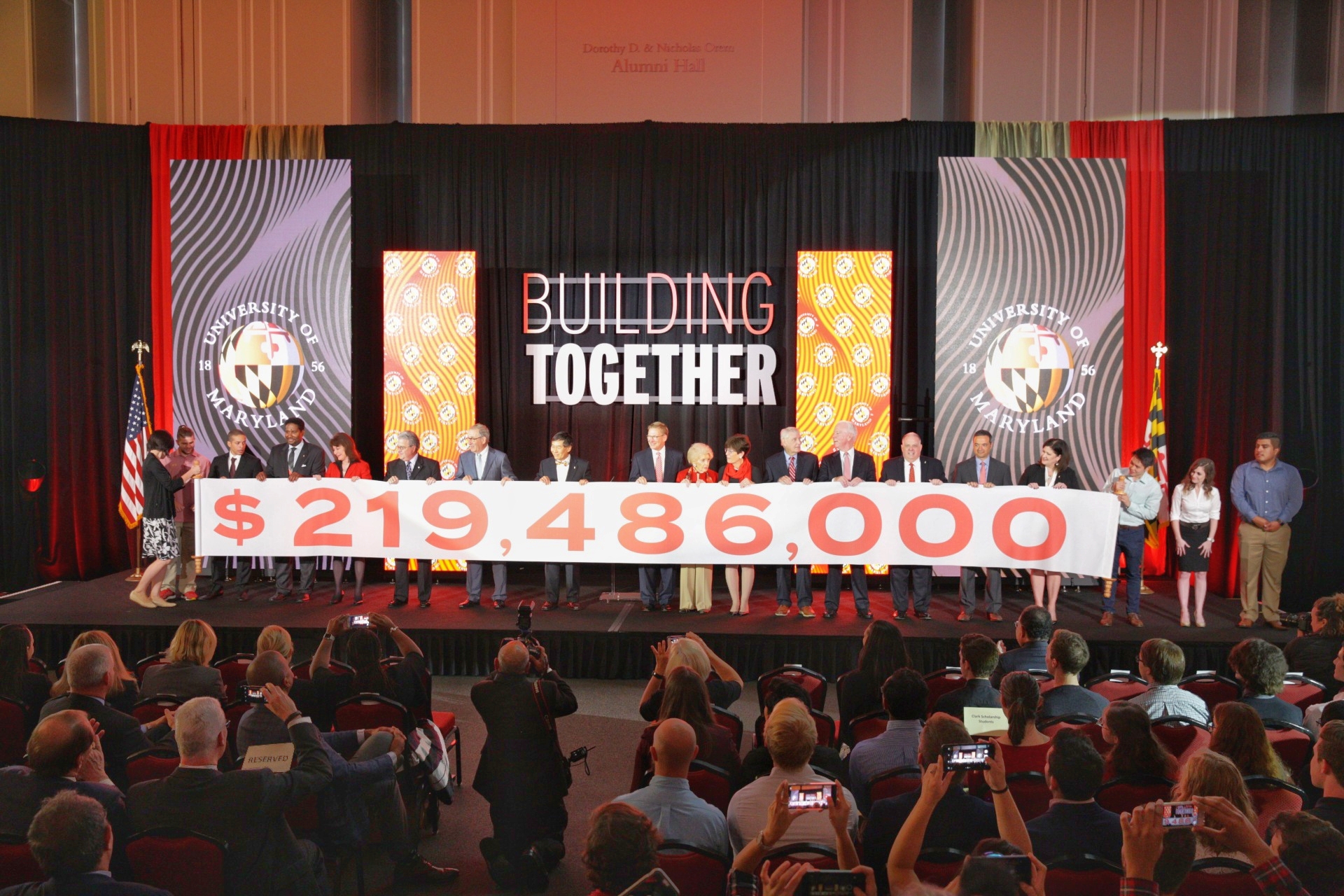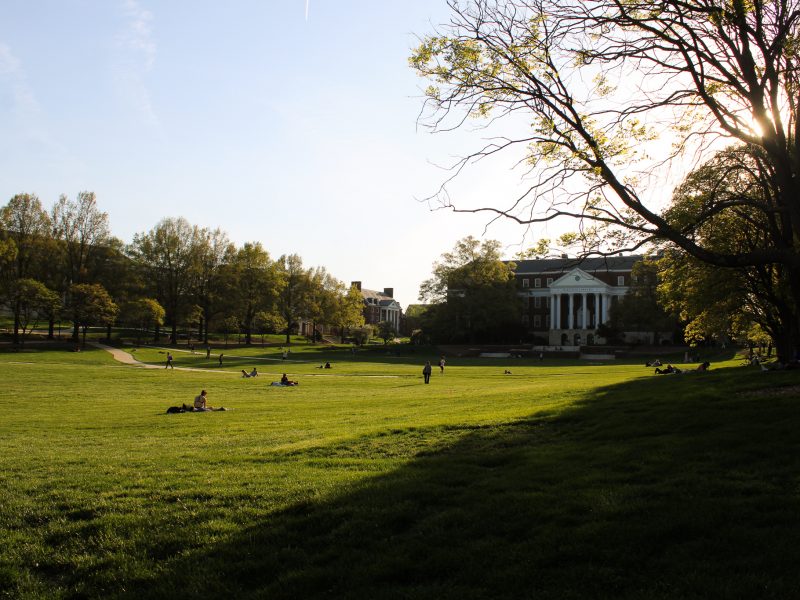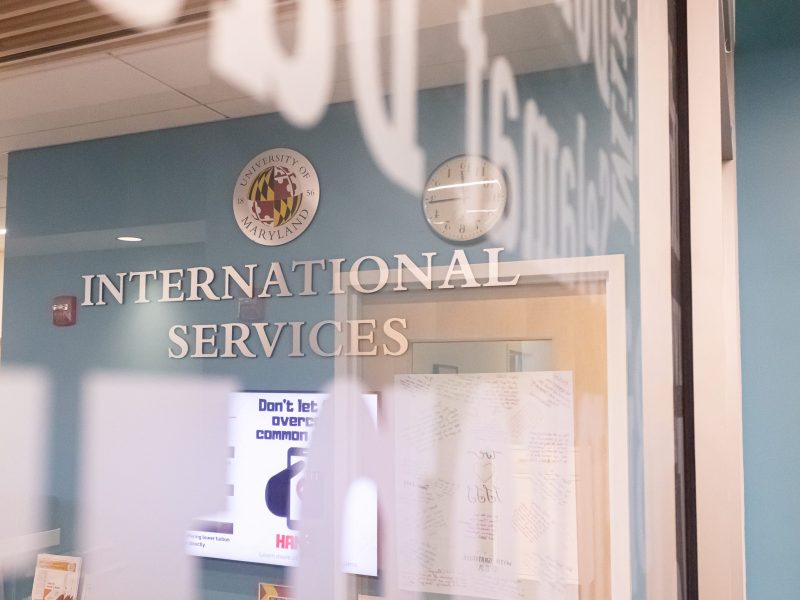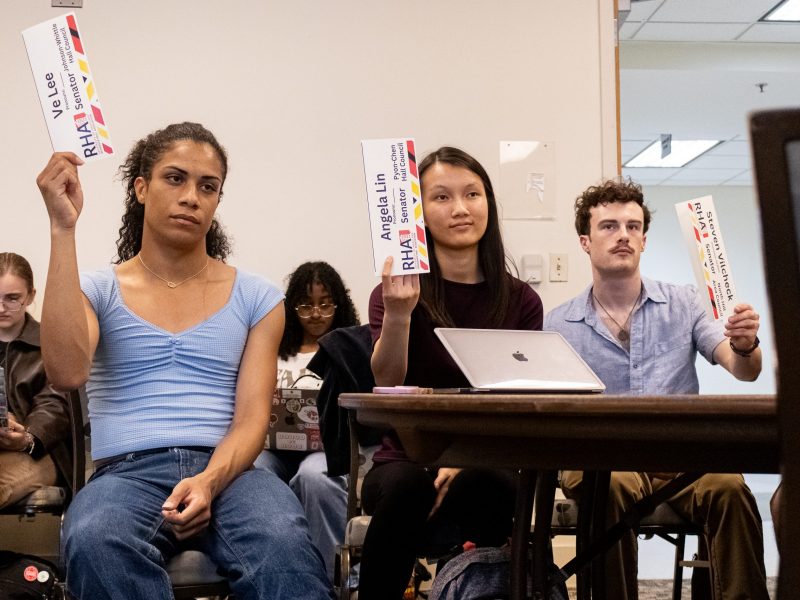The University of Maryland will receive almost $220 million, the largest donation in its history, from the A. James and Alice B. Clark Foundation.
The donation of $219,486,000 will create and fund a variety of need-based scholarships, graduate fellowships, faculty positions, programs and infrastructure for this university and its engineering school, which bears Clark’s name. It was announced at a ceremony Wednesday that included Gov. Larry Hogan, Maryland House of Delegates Speaker Michael Busch and University System of Maryland Chancellor Robert Caret.
The gift will be paid out over the next decade, said Courtney Clark Pastrick, board chair of the Clark Foundation and A. James Clark’s daughter. About half of it will go toward need-based scholarships, doubling this university’s financial aid support, she said.
“My dad was extremely committed to creating affordability and access to an education at his favorite school,” she said.
The previous record, a $31 million contribution from Oculus VR founder Brendan Iribe in 2014, mainly went toward the construction of the new Brendan Iribe Center for Computer Science and Innovation, which is slated to open for occupancy in January 2019.
Hogan dubbed it “the most important day in the history of this university.”
“Thousands of University of Maryland students wake up in dorms and study in academic halls or are here as a result of scholarships that bear Mr. Clark’s mark,” he said. “Today, Clark’s spirit of generosity is on full display yet again, even more than ever before.”
[Read more: Oculus VR founder to give largest donation in university history]
The Clark Foundation’s donation, which university President Wallace Loh said was about two years in the making, will establish a need-based scholarship program for prospective students of all majors. The foundation’s donations to this pool will be matched by the university’s private fundraising, creating a total of $100 million in need-based scholarships, Loh said.
Loh said this brings the life of university alumnus A. James Clark “full circle,” by providing for the next generation of lower-income students.
“He’s told me this story himself: There were times when he couldn’t afford the bus fare, and he had to hitchhike to come here — he was a commuter student,” Loh said. “What made his education possible was a scholarship. He has said repeatedly, ‘I have never forgotten that.'”
The highlight of the contribution is the campuswide scholarship program, said Darryll Pines, the engineering school dean.
“In this gift there is a huge opportunity to potentially double the need-based scholarships for students who have need and therefore allow more students to reduce their burden and go to school and get an education across the entire university,” he said. “So that makes me the most proud.”
Pines said the donation will help the college continue to participate in influential research such as the Solar Decathlon competition, where students design and build a sustainable solar-powered home.
The gift also sets aside construction funds for improvements to engineering facilities and labs, alongside a new “innovation hub” building to grow engineering research into companies.
“[Clark] wants to have another facility where bright, talented students and their faculty mentors and other people get together and put their ideas to work,” Loh said. “It’s for a whole bunch of innovation like cybersecurity, like neuroscience, like robotics, drones, which is of course the technologies and industries of the future.”
[Read more: The new home of UMD’s bioengineering department will be ready this month]
The record gift also endowed a pilot program that will grant need-based scholarships to engineering majors transferring to this university from a Maryland community college.
“That’s another opportunity,” he said. “I think we forget about those students who transfer from two-year institutions here.”
The donation will establish the A. James Clark Scholars Program, which will support high-achieving engineering students with financial need. Similar programs are available at George Washington University, Virginia Tech University and Johns Hopkins University. Each of these universities received donations between $15 and $16 million, and boasted some connection to Clark or his family.
Freshman engineering major Jesse Parreira earned a scholarship when he was admitted to this university last year and said Wednesday’s announcement was “amazing.” The donation will expand such scholarships significantly, as his own scholarship will help him pursue his interests in robotics and mechanical engineering, he said.
“The Clark scholarship definitely played a big part of me coming to Maryland … this has been a big help for me in my experience,” he said. “It’s amazing to see the generosity of the foundation.”
The Clark Foundation’s investment sets up the Clark Doctoral Fellows Program, which will add 30 fellowships to the engineering school. The Clark Distinguished Chairs and Clark Leadership Chairs programs will also add 13 faculty chairs in different speciality areas.
The $220 million donation comes from Clark’s personal wealth, some of which was designated to the Clark Foundation to be distributed to universities nationwide after his death in 2015. Clark attended this university on a scholarship and eventually formed Clark Construction, which is well known for its work in the D.C. area, such as 28 Metro stations the World Bank headquarters, FedEx Field, Nationals Park and the National Museum of the American Indian.
Clark also donated $15 million before his death in 2015 to support the design and construction of the A. James Clark Hall, set to be dedicated next month and hold classes starting in the spring, as a new home to this university’s bioengineering department.
James Belle, a junior at College Park Academy, a charter school developed in partnership with this university, said the announcement makes him all the more eager to apply to study architectural engineering here.
“I’m really excited to come here and see if they can help me become an engineer,” he said. ‘I was going to apply, but now I’m really serious about coming to Maryland.”
Caret said this university has always played a leadership role in research, and this gift will continue its legacy.
“Starting with agriculture in the beginning and moving into virtual reality, the flagship campus continues to do what it has always done, and was built to do from the beginning, The gift provides the cornerstone to the future of this campus,” he said.
CORRECTION: Due to a reporting error, a previous version of this story incorrectly stated the investment would start pilot program granting need-based scholarships to engineering majors transferring to this university from a Maryland community college. The investment endowed this program, which enrolled its first class for the 2017-18 academic year. This story has been updated.



